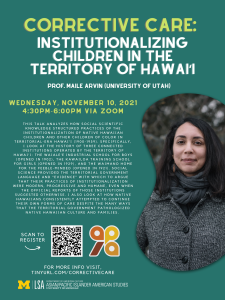Presented By: Asian/Pacific Islander American Studies
Corrective Care: Institutionalizing Children in the Territory of Hawaiʻi
Maile Arvin, Assistant Professor of History and Gender Studies, University of Utah

This talk analyzes how social scientific knowledge structured practices of the institutionalization of Native Hawaiian children and other children of color in Territorial-era Hawaiʻi (1900-1959). Specifically, I look at the history of three connected institutions operated by the Territory of Hawaiʻi: the Waialeʻe Industrial School for Boys (opened in 1902), the Kawailoa Training School for Girls (opened in 1929), and the Waimano Home for the Feeble-Minded (opened in 1921). Social science provided the Territorial government language and “evidence” with which to argue that their practices of institutionalization were modern, progressive and humane, even when the official reports of those institutions suggested otherwise. I also look at how Native Hawaiians consistently attempted to continue their own forms of care despite the many ways that the Territorial government pathologized Native Hawaiian culture and families.
Maile Arvin is an assistant professor of History and Gender Studies at the University of Utah. She is a Native Hawaiian feminist scholar who works on issues of race, gender, science, and colonialism in Hawai'i and the broader Pacific.
Maile Arvin is an assistant professor of History and Gender Studies at the University of Utah. She is a Native Hawaiian feminist scholar who works on issues of race, gender, science, and colonialism in Hawai'i and the broader Pacific.